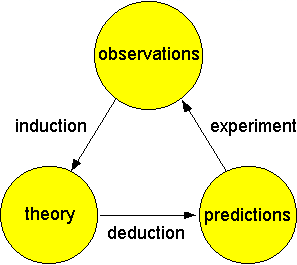

The scientific method is a procedure for approaching the truth by weeding out false hypotheses, systematized in 17th century by Francis Bacon, Descartes and Galileo
Key features:An idealized schematic of the procedure:

A theory that makes no testable predictions is not amenable to the scientific method, even if true.
NOTE: In Astronomy, we often have to wait for nature to do the experiment for us.
WHAT IS TRUTH?
Possible outcomes of an experiment:
Because it is not possible to observe every event in the Universe under every possible set of circumstances, a theory can never be proven true; it can only be proven false. (Karl Popper)
VARIABLES.
The quantities on which the outcome of an experiment depends are called variables.
An experiment will be reproducible if we are able to specify all the variables that govern the outcome. (For instance, does the outcome of the experiment depend on the temperature? the weather? the position of Jupiter? vibrations caused by a truck rumbling by outside?)
If the result of the experiment vary from repetition to repetition, there must be at least one variable that governs the result that we have not specified.
To determine cause and effect relationships, the ideal method is to repeat an experiment under two nearly identical conditions, changing only one variable. The experiment with the variable unchanged is called the control.
If the outcome does not vary when we change a variable, then the result of the experiment is not governed by that variable by itself.
CAUSE AND EFFECT vs. CORRELATIONS
Sometimes causes are extremely complex, and may not be governed by a single variable.
Example: what is the cause of divorce? There are many.
Example: Is there a gene that causes heart disease or diabetes? A person may be genetically predisposed to certain diseases, but other factors such as smoking or high cholesterol levels, may be required to bring on the onset.
Correlations don't prove a cause and effect relationship.
Example: there is a correlation between the number of television sets and heart disease. But watching television does not cause heart disease--both numbers have been increasing with time, but for independent reasons
Example: suppose a study shows that there is a correlation between smoking and lung cancer. However, that does not prove that smoking causes lung cancer. It might be, for instance, that more people who live in cities smoke, and something about the city environment (perhaps pollution) causes lung cancer. You would have to show that the correlation between smoking and lung cancer is independent of dwelling place, so urban vs. rural is eliminated as a variable. And so on.
MEASUREMENT
1. Errors.
Errors are unavoidable in any experiment. No measurement is perfect.
Two kinds of error:
Random errors can be eliminated by repeating the measurement many times and averaging the results.
Systematic errors can not be eliminated by averaging, but if they are detected, they can be corrected for.
Only extremely careful experimental design and calibration can reduce systematic errors -- for example, calibrate your instruments against a known value
2. Uncertainty
Since every measurement includes some error, it is essential to provide an estimate of the likely range of errors. Example: if you say the length of a shadow is 14.5 ± 0.1 cm, you mean that the actual value of the length probably lies between 14.4 cm and 14.6 cm (usually with some definite probability). If you merely say that the length is 14.5 cm, that's useless: your measurement cannot possibly be exact or without any error, but you haven't given anybody a clue how close the actual value might be to the value you've claimed.
SOCIOLOGY OF SCIENCE
"Science wars" -- sociological analysis
Social factors:
Philosophical: "realism" vs. "nominalism": can we ever really know what is "reality?"
(Plato's myth of the cave)
debate appears to overlook third choice -- empiricism
A theory becomes accepted by consensus. In controversial areas, interpretation of the experimental evidence may be too difficult for a consensus to form, at least initially. For that matter, it's important to recall that because science is inductive, all theories are just models, subject to revision or replacement. As Plato pointed out, we can never truly know what is reality. In view of this epistemological uncertainty, the following conclusion is truly surprising and unexpected:
CONCLUSION
The scientific method has proven to be quite successful within its domain of validity. Nature apparently behaves as if it were governed by simple laws that can be discovered by experiment/observation.
your instructor